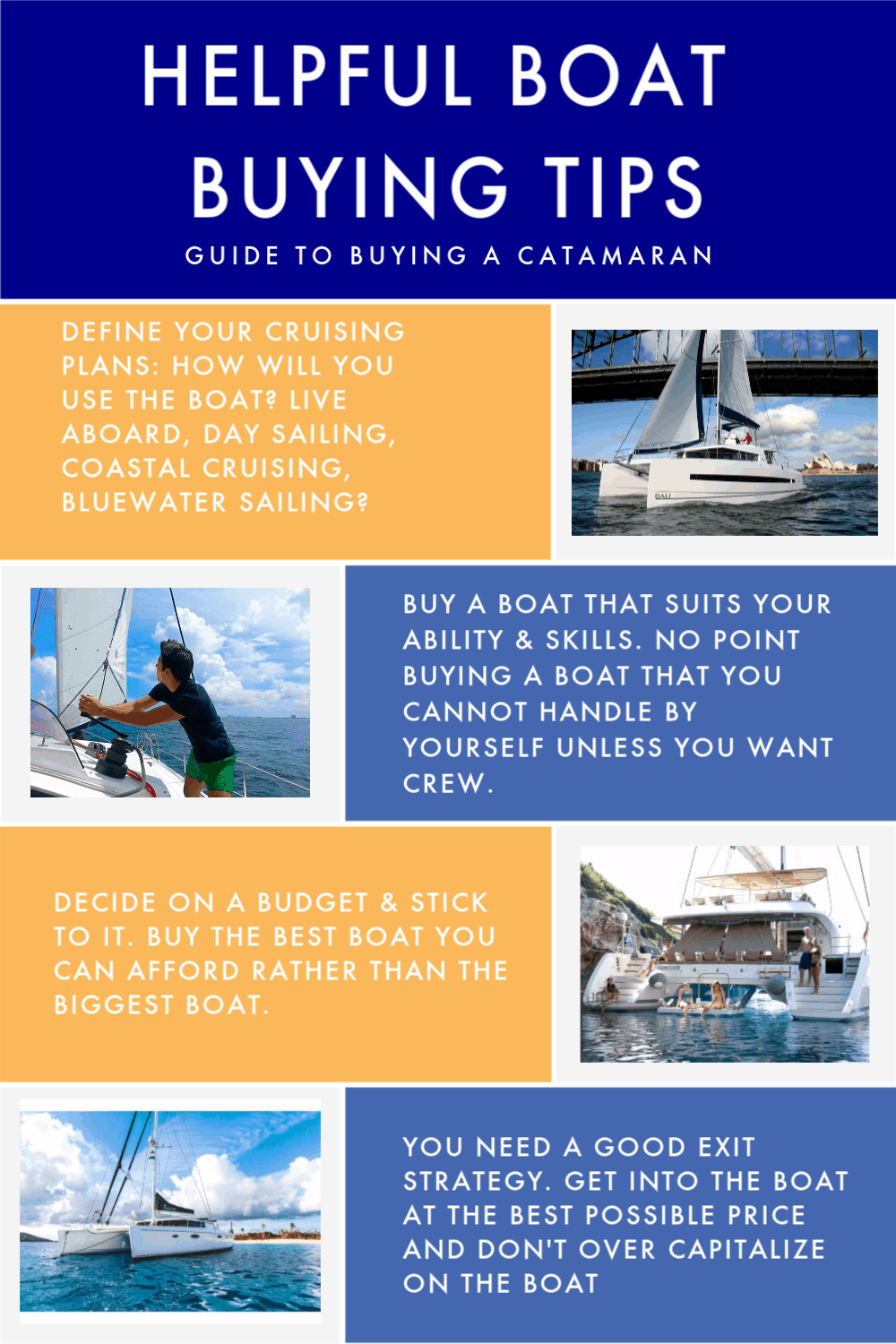 Narrow your choices to a short list of boat categories and make a short list of features that you require, features that you would like, and features that you want to stay away from. Once you narrow your category choices down, it’s time to go shopping. Visit a local boat show and board as many boats as you can. Consider all available options. Below are some tips on how to narrow down the choices.
Narrow your choices to a short list of boat categories and make a short list of features that you require, features that you would like, and features that you want to stay away from. Once you narrow your category choices down, it’s time to go shopping. Visit a local boat show and board as many boats as you can. Consider all available options. Below are some tips on how to narrow down the choices.
How Will You Use Your Yacht: Define Your Cruising Plans
- Charter Management Programs: If your time is limited and you are working towards your goal to go cruising full-time in say 2 or 5 years, a boat in charter management with a guaranteed income plan in a charter company with bases all over the world with 2-6 weeks of owner use/year, would be ideal for you. See our yacht charter ownership programs in a nutshell.
- Daysailing or Coastal Cruising: You want to privately own and want to primarily sail on weekends or short trips best described as coastal-cruising voyages, a rugged blue water cruiser may be overkill for you.
- Living Aboard and/or Blue Water Cruising: The spacious charter boat you saw at the boat show may be great to live on but it may be a slug underway and you may regret that if cruising long distances. When cruising you will not only want a comfortable boat but a safe boat and reasonable cruiser remember, every knot of speed can make the difference when trying to sail out of or away from a storm.
- How Many People Will You Be Cruising With? (i.e. how many sleeping cabins do you need?) Most catamarans have a minimum of three sleeping cabins and more storage space than you will ever use. However, as you add more weight to a cat, the sailing characteristics are altered significantly. The standard Lagoon 42 that will hit an exhilarating 16 knots on a broad reach in 25-30 knots of wind can turn into a slug that can barely reach 9 knots when loaded down with generator, air-conditioning, extra water and fuel, and tons of gear.
- Application: A yacht that is suitable for charter may not necessarily be the best for a couple’s live-aboard. Many people tell me, “We will cruise our new boat for “x” months, then we will put it into a charter program”. Well, then, you must go with a charter type boat (lots of staterooms and simply equipped) because otherwise, you will get killed by high maintenance costs and low utilization. If you plan to do extended cruising, choose a boat that is comfortable for the owner.
Set Parameters For Your Yacht Search
- Be Prepared: Arm yourself with facts about that model of yacht/catamaran. Know why the seller is motivated to sell.
- What Is Your Time Frame: Because of the popularity of catamarans often the builders are running about 6 months to 18 months out in production availability and delivery can range anywhere from 1 to 2 months after that.
- Set Goals and Limits: Know when to walk away. Know that you have other choices of yacht/catamaran.
- List the alternatives: Maintain emotional distance: Use your broker as a go-between. Don’t allow yourself to get angry or offended at the opposing side. Cultivate patience. Give yourself time to plan replies to counter-offers.
- Start the Negotiation: Make “rediculous”offers and get the process started. The seller will usually counter but if not, at least you will know where the limits are. Your broker can be of help here with price comparisons of the same or similar boats sold recently to establish the parameters.
- Put Your Offer In Writing: It has double the “weight” and will be taken much more-seriously.
- Get Pre-Approved for financing: If you can tell the Seller that you are already approved, it will make your offer that much more powerful.
- Stay Flexible on Acceptance Date and Closing Date: These are very important to the Seller.
- Listen Effectively: Plan questions in advance of negotiations.
Tax Advantages Available For A Yacht Purchase
- Apply Taxes Towards a Yacht: In order to stimulate the industry, the government has made subsidies available to US residents in the form of tax breaks: If you are a U.S. taxpayer/Resident who is in the 25% or greater tax bracket and has a current annual tax liability of $50,000 or more? If so, then there is a little-known way to buy a new yacht and apply the taxes that you already pay, towards paying for your yacht. Go to this link Active Yacht Ownership Program to find out more about the yacht as a business.
- Second / Vacation Home: Your yacht could qualify as a second /vacation home and apply that tax advantage.
- Legal Exemption from Certain Taxes: If you understand the system, you know how it is possible to be legally exempt!…Offshore registration is a legal way to avoid paying sales/use taxes and Customs duties. However, you can usually expect to pay $1,000 to $5,000 to set up an offshore corporation. Most larger catamarans prefer to register foreign flag because it offers more privacy, no taxes and less liability. Some U.S. lenders are comfortable with yachts/catamarans registered in U.K. “Red Ensign” countries. (i.e. former British colonies like the BVI, Cayman Islands, Bahamas, and Barbados). Some US lenders will insist upon U.S. Documentation, so check with your lender early on. The drawback to offshore registration is that you will have to exit the U.S. once/year to renew a Cruising Permit in order to remain in U.S. waters. The other drawback is that the attorneys in these offshore jurisdictions charge $1,500-5,000/year to maintain the holding corporations not unlike a trust.
- Register as a Corporation: Sales and Use taxes are levied in the U.S. by the individual states and generally apply to US Residents. Each state is somewhat different in their approach to this subject. Whether you owe this tax has to do with where the catamaran is registered and where and how the catamaran will be used. Buyers who qualify, will register their yachts in a tax-free state like Delaware in the name of a corporation. These corporations cost around $250 to form and around $100/year to maintain. This is the most cost-effective “state” registration. You may want to “Document” or federally-register your yacht/catamaran if you are traveling mostly outside the U.S.This can also be done in the name of a Delaware corporation but only US Citizens can Document their vessel. Non-U.S. citizens cannot own a U.S. Documented vessel.
Top Tip: Use a Broker at No Cost
Since you are reading this article, you likely have discovered how many choices are available in yachts and ways to own them. You perhaps are overwhelmed with all the tax jargon, legalese, and potential traps. That’s where a broker can help. The seller pays yacht broker commissions so the advice from someone who has done these type of catamaran shopping activities and buying transactions is free to you. We have helped thousands of yacht buyers find the right boat, the right program, or the right situation. We can help you, too. If you still want to explore on your on, visit our buying a catamaran section.
Contact Us
Contact a Broker Directl
Our brokers don’t just excel at buying and selling catamarans, they live the lifestyle. Each of our brokers have been a part of the Catamaran Guru community for years because they love and live everything catamaran.





